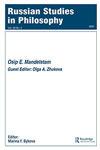作为后革命哲学的古典欧亚主义
IF 0.1
4区 哲学
Q4 Arts and Humanities
引用次数: 2
摘要
摘要古典欧亚主义(yevraziystvo,1921,1930年代末,不包括尼古拉·古米列夫)是一套以尼古拉·特鲁别茨科伊(1890-1938)提出的思想为中心的多方面教义。在众多的俄罗斯移民思想中,只有古典欧亚主义对两个基本问题提供了一个健康而系统的答案:1917年革命灾难为什么会发生,之后俄罗斯应该走什么路?这个答案首先基于特鲁别茨科伊的教导,自1920年出版《欧洲与人类》以来,特鲁别茨科强烈反对欧洲中心主义,为这一结论提供了复杂的理论论据,并坚持俄罗斯回归自我,回归其文化和历史的内在逻辑。古典欧亚主义详细阐述了俄罗斯思想家在19世纪初提出的反对obshechelovecheskoye的概念。这两个概念都指向人类思想、人类文化和人类文明的普遍性;但用于达成普遍性的逻辑载体存在根本差异。vsechelovecheskoye以“收集”逻辑多样的模型为前提,而不对其施加任何一般性限制,而obshechelovecheskoye则是对基于一般或一般的普遍性的理解,这对西方读者来说是众所周知的。与vsechelovecheskoye相关的古典欧亚主义的一套基本哲学概念包括:sobornost、obshee delo(普通作品)、demotia(人民的直接统治)、pravashiy otbor(统治选择)、pravda(真理)等。本文章由计算机程序翻译,如有差异,请以英文原文为准。
Classical Eurasianism as a Post-Revolutionary Philosophy
ABSTRACT Classical Eurasianism (yevraziystvo, 1921-late 1930s, not including Nikolai Gumilev) is a multifaceted set of teachings centered around ideas introduced by Nikolai S. Trubetskoy (1890-1938). Out of the multitudes of Russian emigrant thought, only classical Eurasianism offered a wholesome systematic answer to two basic questions: why did the revolutionary catastrophe of 1917 occur, and what path should Russia follow after it? This answer rests first and foremost on the teachings of Trubetskoy who, since his Europe and Humankind published in 1920, strongly opposed Eurocentrism providing a sophisticated theoretical argument for this conclusion, and insisted on Russia’s returning to its self, to the inherent logic of its culture and its history. Classical Eurasianism elaborated the concept vsechelovecheskoye which had been introduced by Russian thinkers in the early nineteenth century in opposition to obshechelovecheskoye. Both notions point to the universality of the human mind, human culture, and human civilization; but there is a fundamental difference in logical vehicles used to arrive at the universal. The vsechelovecheskoye presupposes “gathering” logically diverse models without imposing any general restriction on them, while the obshechelovecheskoye is an understanding of the universal as grounded in the generic or general, which is well-known to the Western reader. A set of basic philosophic notions of classical Eurasianism related to vsechelovecheskoye include: sobornost’, obshee delo (common work), demotia (direct rule of people), pravashiy otbor (ruling selection), pravda (verity), and others.
求助全文
通过发布文献求助,成功后即可免费获取论文全文。
去求助
来源期刊

RUSSIAN STUDIES IN PHILOSOPHY
PHILOSOPHY-
CiteScore
0.10
自引率
0.00%
发文量
14
期刊介绍:
Russian Studies in Philosophy publishes thematic issues featuring selected scholarly papers from conferences and joint research projects as well as from the leading Russian-language journals in philosophy. Thematic coverage ranges over significant theoretical topics as well as topics in the history of philosophy, both European and Russian, including issues focused on institutions, schools, and figures such as Bakhtin, Fedorov, Leontev, Losev, Rozanov, Solovev, and Zinovev.
 求助内容:
求助内容: 应助结果提醒方式:
应助结果提醒方式:


